The Laughing Death - Why Cannibalism is Bad for You
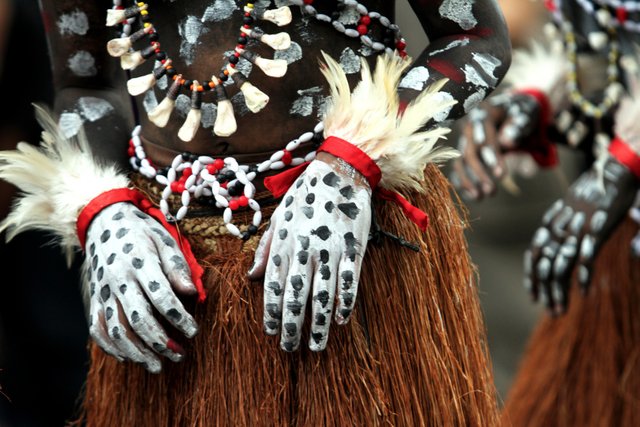
Thinkstock Image of a Tribe from PNG
Introduction
I have described previously how I have an interest in neurodegenerative diseases. When things go wrong in the brain it has a tendency to reveal all sorts of interesting things about how this amazing organ functions.
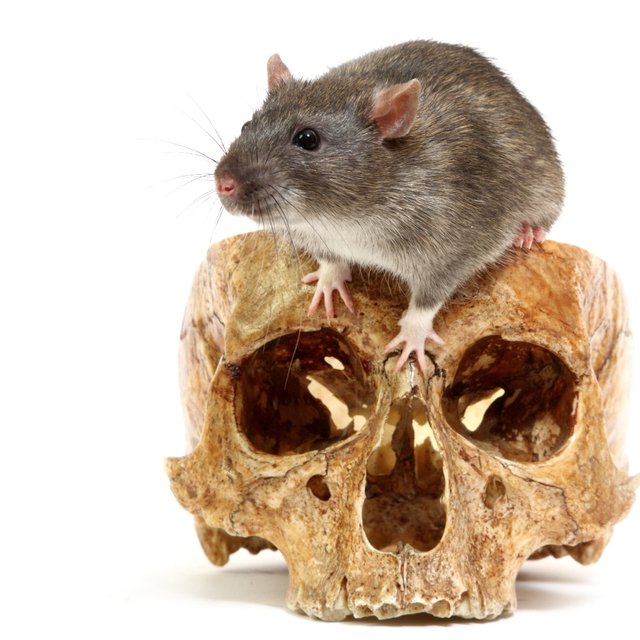
It can also sometimes reveal how certain practices may have unforeseen consequences.
For example the ancient Romans may have unwittingly poisoned themselves by lining their cooking utensils and water pipes with lead [2].
In more recent centuries, arsenic based paints are thought to have killed people who didn't realise that the price of a brilliant green colour was an early grave [8]. Popular culture has also brought attention to the "mad hatter" syndrome - a neurological disease which was caused by occupational exposure to inorganic mercury [9].
Most of us in the West would consider that cannibalism (except in very rare circumstances for survival) is a morally "bad" thing.
It is almost universally a taboo in modern cultures but it may not always have been that way. Multiple archeological finds, including this one reported in Ars Technica recently [6], suggest that it has occurred multiple times throughout history.
What I find of particular interest is the possibility that this taboo may exist for medical as well as moral reasons.
Quick note before we move on: - you may find some of the video clips and descriptions in this post distressing - please keep this in mind if you are at all squeamish or sensitive.
A 20th Century Medical Mystery
In the 1950s a curious and fatal illness was discovered amongst a tribe called the Fore people of Papua New Guinea [3,4,5,7,10].
Video illustrating symptoms - NB - distressing images
Here is an account of the illness taken from the book "Brain Trust" [5]:
A young woman sat in the corner of the mud hut. Though she was bone thin, it was the look on her face that startled her visitor. The woman’s face was expressionless. Her eyes were blank. The lack of expression was so profound, in fact, that she could have been wearing a flesh-colored mask. Every few minutes, a fluttering tremor ran through her body, as if she was shivering uncontrollably from a cold wind.
The symptoms would start out mild but progress quite rapidly.
People would develop tremors, slurred speech and an unusual gait when they walked.
This was accompanied by exaggerated emotions such as excessive laughter with "minimal provocation" and more rarely aggressive behaviour.
The increased tendency to laugh gave rise to one of the descriptions of the illness as "the laughing death".
Sufferers would progressively lose muscular co-ordination and find it more and more difficult to walk, eventually ending up bed-bound and fully dependent on family members to look after them.
Video illustrating latter stage symptoms - NB - distressing images
In the terminal stages the ability to speak and swallow would be lost. Death would result soon afterwards from starvation, dehydration or pneumonia caused by aspiration (inhaling saliva or stomach contents).
The total course of the disease would last 3-6 months from the first onset of symptoms. It was universally fatal.
Most alarmingly those who developed this illness retained insight into their predicament for as long as physicians were able to test it.
One can only imagine the horror of being in such a situation.
Some Clues to the Mystery
Up until the 1980s the causative agent of this disease which the Fore tribe called "Kuru" were unknown but research which began in the 1950s yielded some important clues.

Two physicians named Gajdusek and Zigas [3,5] are responsible for collecting much of the medical and cultural information we know about Kuru and were instrumental in the eventual discovery of the cause.
The tribe themselves attributed it to sorcery which was consistent with their cultural beliefs.
Some of the important findings that Gajdusek and Zigas made [4,5,7,10] were that Kuru:
Mainly affected adult women and adolescents of both sexes.
Was always fatal.
Did not induce an inflammatory response or any obvious laboratory testable changes in the subjects.
Did not appear to be caused by any known environmental toxin or infectious agent.
Did not respond to any medications (including antibiotics) or indeed to supplementation with vitamins.
Caused "widespread neuronal degeneration" on post mortem examination, with areas involved in movement and coordination affected most badly.
Gajdusek and Zigas' work is a fascinating story of scientific detective work and investigation, as well as a colourful insight into how one of the last primitive human cultures lived.
I can't cover it all here but if you are interested Zigas wrote about in in a book called the "Laughing Death".
It is also summarised very well in Colm Kelleher's book "Brain Trust" [5].
This book has some rather alarming conclusions and as a result I should warn that if you are squeamish or prone to hypochondriasis you should probably not read it.
Problems with Prions
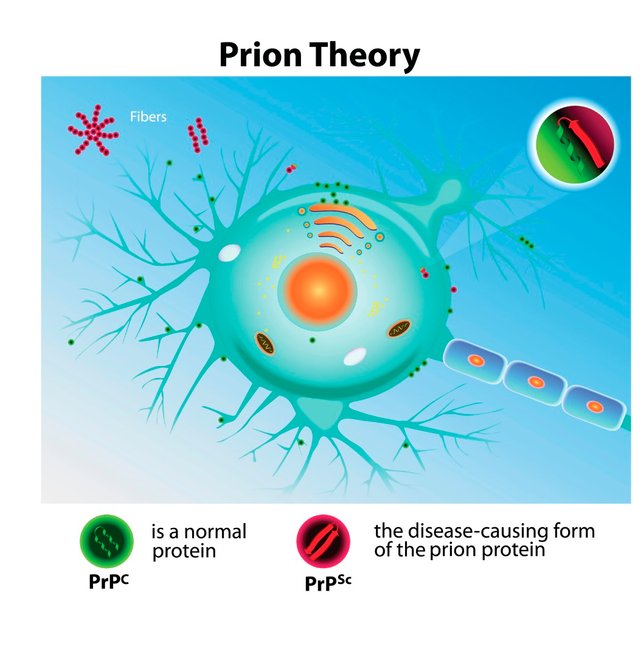
It was eventually deduced that Kuru was caused by an infectious agent unlike any other known to science at the time.
It was caused by an abnormal "prion" - a particular type of protein that can become misfolded and cause disease [4].
All mammals produce prions and it is not fully understood exactly what they do - it is believed that they have some sort of regulatory or supportive role in the brain and nervous system.
The normal version of the prion protein is called PrPc.

Prion diseases like Kuru are caused by a misfolded version of the normal prion (PrPsc) which seems to be able to somehow replicate by changing the shape of the normal versions too.
It is still not understood exactly how this occurs or indeed why it causes damage to the brain.
The strange thing about prions is that they are the simplest infectious agent known. They do not have any nucleic acids (DNA or RNA) yet they still replicate.
Further this simplicity makes them very resilient to destruction from heat, radiation or chemicals.
This is why prion diseases like BSE (mad cow disease) and scrapie (found in sheep) are so difficult to deal with in farm animals.
The infectious prions are almost impossible to destroy by normal methods and can persist in the environment for prolonged periods.
Why Cannabilism is Bad

It is now known that Kuru spread amongst the Fore tribe as a result of ritual endocannibalism (eating members of your own community) as part of their funerary customs.
The key piece of information was discovered by a female researcher named Lindenbaum [5]:
Lindenbaum learned that Fore society was one of huge gender disparities. Fore women lived in a different world from their men, and this different world had some very secret customs. In a remarkable discussion with Richard Rhodes, author of Deadly Feasts, Lindenbaum revealed the shocking details about the secret cannibalism practiced by Fore women: “They hid in the garden, they did it at night, did it away from the eyes of people, they did it in the old sugarcane gardens and sometimes even in the burial ground. It stirred erotic excitement and maybe even gender power. Women were attacking men’s bodies. It was their own domain and men were kept out.”
It should be noted that Lindenbaum's interpretation of this as an "attack" is not necessarily accepted by later authors/observers and seems to be somewhat prejudiced by her own beliefs.
Whitfield et al [10] call it "transumption" (to escape the stigma of cannibalism) and describe the practice among the Fore as follows:
Transumption was a religious practice with associated rituals and was performed out of love and respect for the deceased and their family. It is in distinct contrast to Western perceptions of cannibalism, which can be seen as an offensive term when used in this context. The bodies of the dead were placed in the finest sepulchres that the people had available—their own bodies
Kuru resembled another illness that occurs sporadically in the human population called CJD (Creutzfeldt Jacob Disease).
It is likely that the cannibalism carried out by Fore women resulted in the spread of a CJD-like prion amongst the female population.
Further, the involvement of children in the practice is probably how most men may have become infected (it is known that prion diseases can have a very long incubation period).
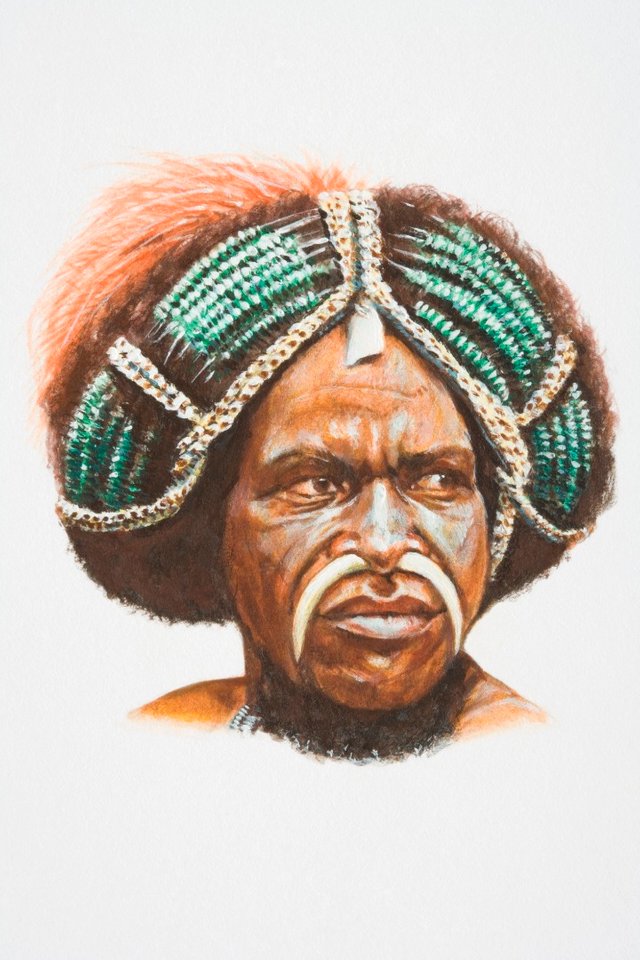
Surrounding tribes which did not engage in cannibalism did not suffer from Kuru at all despite living almost identical lives.
What made the situation worse was the tribal belief that Kuru was caused by sorcery. The only way to treat it was by killing the "alleged" sorcerer and oftentimes consuming their bodies.
The fact that nobody recovered did not seem to alter the practice . This may at least in part relate to the Fore's vastly different understanding of time (and cause and effect) when compared to more contemporary cultures [5].
The result was that this created a kind of double tragedy for the Fore people. As Kuru ravaged more and more of their society the ritual killings in response to it increased and more people died.
The consumption of the alleged sorcerer probably increased the spread of the disease.
The Epidemic Ends
Cannibalism was banned in Papua New Guinea by the Australian authorities in the mid 1950s [10].

By this time it is believed that as much as 2% of the population had been killed by the disease (and this is a conservative estimate) [4] as some localised areas seemed to be particularly badly affected.
Some villages ended up completely free of adult women.
As expected enforcement of the "ban" caused the "epidemic" to end [4,10]:
The epidemic began to decline in the 1960s, and the epidemiological patterns of kuru showed changes from the early 1960s, with progressive disappearance of the disease in the younger age groups and a contraction in the area of high incidence. It has since been established that none of more than 2700 recorded cases of kuru were born after 1959: this birth cohort has grown up completely free of kuru. [10]
It appears there are still occasional deaths from Kuru in elderly people on the island - a sign of the long potential incubation period of Kuru and prion diseases in general.
There appears to be a variability of incubation time related to different genetic subtypes (genotypes). These are discussed in more detail in the paper by Whitfield et al [10] - some seem to slow down development of the disease but once it develops the progression and ultimate result is the same.
Conclusion
I suppose if there is a lesson from the story of Kuru it is that cannibalism is not good for you and prion diseases may be a good medical reason for the taboo!
Another equally important lesson is that good detective work and collaboration are vitally important parts of solving medical mysteries.

For reasons of brevity I have left out most of the mystery solving part of the story but if you are interested I think Colm Kelleher's book "Brain Trust" contains a very good summary of what happened - just make sure you can handle reading it before you do.
From a historical and scientific perspective, Kuru has been very important in learning about a completely new type of illness that was previously unknown to science (in humans at least).
We now know of several different prion diseases that affect humans, including FFI (Fatal Familial Insomnia) [1] which I covered in a blog post some time back.
The one thing that these diseases all have in common is that they are always fatal and must rank pretty high up in the list of the worst ways to die.
Despite what we have learned, there are still many unanswered questions about prions themselves. We still don't really know exactly what they do.
This also means that we are still at a loss as to how to treat them and so far nothing has proven to be effective.
Hopefully that will begin to change as technology improves and continues to reveal the secrets of the brain.
Thank you for reading
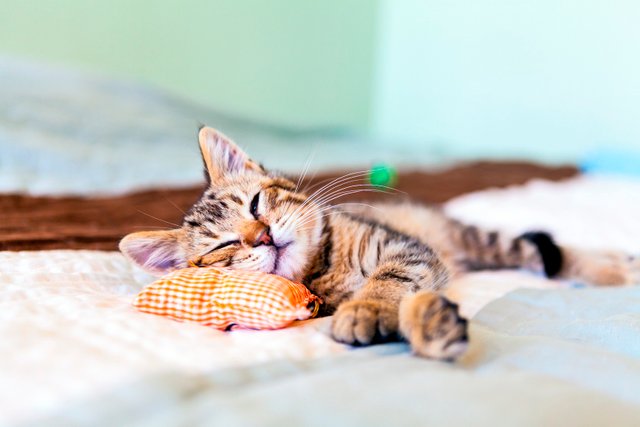
References
Akhtar, Arif. 2017. “Dying to Sleep - The Waking Nightmare of Fatal Familial Insomnia — Steemit.” Steemit. January 14. https://steemit.com/health/@thecryptofiend/dying-to-sleep-the-waking-nightmare-of-fatal-familial-insomnia.
Delile, Hugo, Janne Blichert-Toft, Jean-Philippe Goiran, Simon Keay, and Francis Albarède. 2014. “Lead in Ancient Rome’s City Waters.” Proceedings of the National Academy of Sciences of the United States of America 111 (18): 6594–99.
Gajdusek, D. C., and V. Zigas. 1957. “Degenerative Disease of the Central Nervous System in New Guinea.” The New England Journal of Medicine 257 (20): 974–78.
Imran, Muhammad, and Saqib Mahmood. 2011. “An Overview of Human Prion Diseases.” Virology Journal 8 (December): 559.
Kelleher, Colm A. Brain trust : the hidden connections between mad cow and misdiagnosed Alzheimer's disease / Colm A. Kelleher. 1st Paraview Pocket Books hardcover ed. New York : Paraview Pocket Books, 2004.
Newitz, Annalee. 2017. “There Was an Outbreak of Cannibalism 10,000 Years Ago in Spain.” Ars Technica UK. March 21. https://arstechnica.co.uk/science/2017/03/the-10000-year-old-case-of-the-spanish-cannibals/.
Serrano, Antonio, Jeffrey Liebner, and Justin K. Hines. 2016. “Cannibalism, Kuru, and Mad Cows: Prion Disease As a ‘Choose-Your-Own-Experiment’ Case Study to Simulate Scientific Inquiry in Large Lectures.” PLoS Biology 14 (1): e1002351.
Vahidnia, A., G. B. van der Voet, and F. A. de Wolff. 2007. “Arsenic Neurotoxicity — A Review.” Human & Experimental Toxicology 26 (10): 823–32.
Waldron, H. A. 1983. “Did the Mad Hatter Have Mercury Poisoning?” British Medical Journal 287 (6409): 1961.
Whitfield, J. T., W. H. Pako, J. Collinge, and M. P. Alpers. 2017. “Cultural Factors That Affected the Spatial and Temporal Epidemiology of Kuru.” Royal Society Open Science 4 (1): 160789.

Very interesting article! Another reason, why do not eat any meat! Not only the cannibalism is dangerous!
You have a new follower!
We probably don't need to eat meat in modern times but it is likely our ancestors would not have evolved large brains without it. Personally although I still eat meat I can't help but feel uncomfortable with it for animal welfare reasons.
saçma
??
Disagree. Vegans also get neurodegenerative diseases. And are prone that after a long Vegan diet. It's not healthy it's a religion that puts Animal Life above Human wellbeing and most of the data the quote is from flawed studies and manipulated skewed data. It's very hard for most people to do it right and they start to get malnourish over time which is why most go back to eating meat.
You impress me more and more. Great post!
Thank you so much!
Surprising topic, interesting, creepy :-)
Thanks!
Awesome article! I just read a book about the biological history of cannibalism but the author barely scratched the surface on Kuru and the negative health effects of cannibalism. Definitely interesting to read!
Thank you - what was the book?
Very interesting, thanks!
Does the "normal" prion replicate itself as well or is it generated elsewhere?
Great question! It's a normal protein that is produced in the central nervous system so it doesn't need to replicate.
The abnormal form (PrPsc) replicates because it can change the shape of the regular version (PrPc)- but like I said we don't fully understand the process.
It is possible that there is some bidirectionality in the process in that the abnormal PrPsc can get converted back into the normal PrPc but the current research would suggest that the effect is minimal.
Once introduced the net effect is the accumulation of the abnormal PrPsc. One thing I forgot to say is that the damage may be a secondary result of the abnormal prion protein accumulating.
It may be that the normal PrPc carries out some kind of very vital role in protecting/preserving brain tissue - when it changes to the abnormally shaped version it can no longer do this and so damage accumulates just by normal brain processes.
Synthesis by ribosomes then, like other proteins? I just wondered, because if they reproduced, and what with its helical structure (I looked that up 8-), it almost sounds like a very primitive, pre-DNA form of life, but its being synthesised puts a stop to that idea. Bummer.
So, PrPC is synthesised, and prions multiply by imposing their shape on PrPC, so they don't "procreate" either.
Have they found a reason why prions occur in dead tissue? I mean, what mechanism makes them fold after death to become PrPSc?
Note to self: I should be googling this. Sorry.
Yes exactly.
It is an interesting thing to explore. The problem is they are not really alive by any definition - there is no real metabolic process as such. They are more like viruses in that sense, except even simpler.
Not sure if the process actively happens in dead tissue or not. I suppose it would depend on the physical conditions.
If there are no peri- or postmortem processes changing the shape of PrPC, then there is a patient zero, and this patient zero would have had to be infected in another way, or have a genetic defect that caused the ribosomes to synthesise PrPSc directly, or is the PrPC able to spontaneously transform? Or am I missing an option?
Sorry about the incessant questions, I'm in sponge mode 8-).
The initial patient likely had a mutation to the gene that produces PrPc similar to the sporadic form of CJD - it occurs at a rate of about 1 in every million people if I remember correctly.
Technically such a person would be producing the abnormal protein.
So it is likely that at some point a number of people consumed a relative/friend who had the sporadic mutation and whose body contained the abnormally shaped version.
After doing this, these people then became carriers and subsequently when they died their bodies were consumed and those people became carriers and if their bodies were consumed that spread it onto others...
This way even a very rare disease event i.e. the sporadic mutation can get amplified because of the way that these prion diseases spread.
Further due to the potentially very long incubation period in certain genotypes many cases would be unknown as the people would potentially have died of other causes before they developed Kuru.
No problem I find it fascinating to talk about. It is hard to say with too much certainty about these things as there is still a lot that is not known.
Interesting information. Thank you for sharing!
Thank you for commenting:)
çok saçma
??
Truly great report, thank you. I did know about this and it is related to Crushev-jacobs, alzheimers, HIV, and a host of other similar diseases - good job
Thanks. There is a theory that Alzheimers may act in a similar way although no prion has yet been isolated (as far as I know) but one theory is that there is a dysfunction of protein synthesis. HIV can cause a dementia in the terminal stages although this is less common since the development of modern antivirals.
Bonus video for anyone interested in the topic of Cannibalism, Vice put out this little documentary called, The Cannibal Warlords of Liberia, here is the full film
Thank you:)
Wow very good but they say today there are still many ordinary foods that are poisoning us slowly to an earlier death, also its interesting tribes which did not engage in the cannibalism did not suffer from Kuru, a tribe of cannibal women yikes
Yes that is why we need to be wary of what we eat. The effects of many chemicals were not found out until people started suffering illness.
What is the definition of true trust? Two cannibals blowing each other.
Lol!